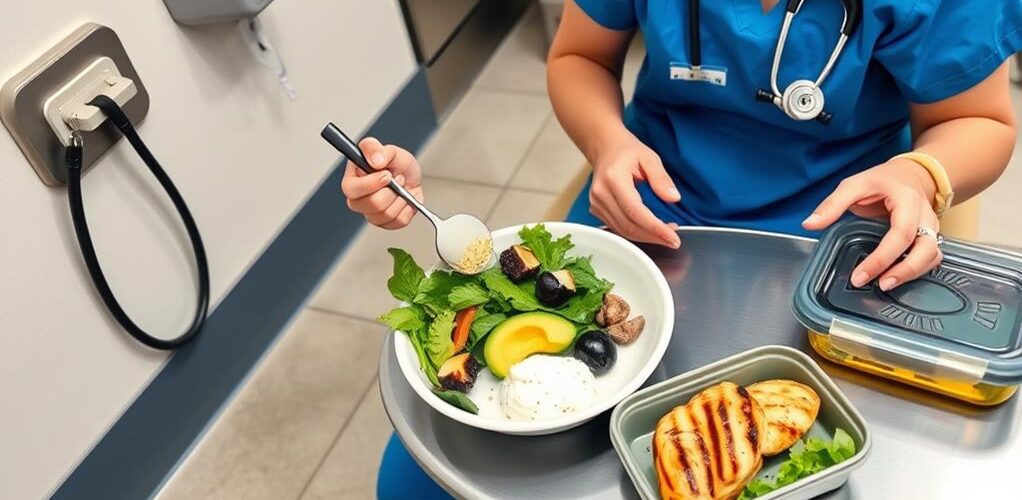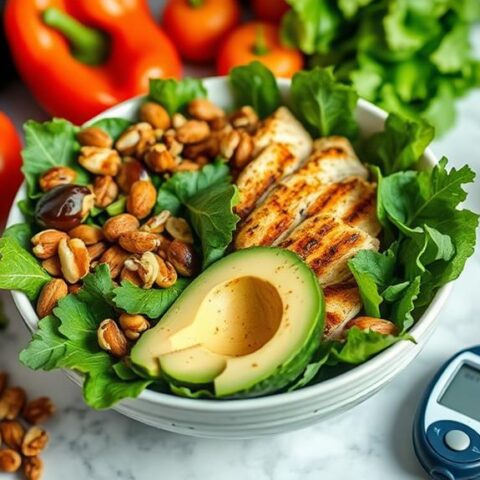
Managing a keto diet on a busy schedule as a nurse or healthcare worker is totally doable. First, prep your meals on weekends. Cook proteins and low-carb veggies in bulk, use slow cookers for hands-free magic, and pack them in quality containers. Keep quick keto snacks like cheese sticks, nut butter packets, and hard-boiled eggs handy to fend off hunger. Staying hydrated is key—aim for 2-3 liters of water daily and use electrolytes to avoid feeling crummy. Sticking to keto helps stabilize energy, which is perfect for those long shifts. Mastering this balance can be easier than you think!
Key Takeaways
- Dedicate weekend hours for batch cooking and portioning low-carb meals for the week.
- Keep quick, portable keto snacks like cheese sticks, nuts, and avocado cups for energy during shifts.
- Stay hydrated with at least 2-3 liters of water daily, and incorporate electrolyte sources like bone broth.
- Plan for quick, easy-to-assemble meals to ensure healthy options are always available.
- Gradually reduce carbs to ease the transition into keto and mitigate keto flu symptoms.
Benefits of Keto for Healthcare Workers
The ketogenic diet offers numerous benefits for healthcare workers, considerably enhancing their day-to-day performance and overall well-being. One of the primary keto benefits is the significant improvement in mental clarity. Healthcare workers, often dealing with long shifts and demanding workloads, can experience heightened focus and sharper cognitive function. This is essential in high-stress environments where quick, accurate decisions are critical.
Moreover, the diet's ability to stabilize blood sugar levels reduces the risk of energy crashes, allowing healthcare professionals to maintain consistent energy throughout the day. By promoting fat as the primary energy source, the ketogenic diet helps manage cravings and hunger, making it easier for busy nurses to adhere to their meal plans.
Research also highlights substantial weight loss benefits from the ketogenic diet, with average reductions of -18 kg for men and -11 kg for women over 12 weeks. For healthcare workers, maintaining a healthy weight is essential due to their physically demanding roles.
Additionally, the diet decreases insulin levels and improves insulin sensitivity, which is particularly beneficial for those at risk of type 2 diabetes.
In essence, the ketogenic diet not only boosts energy and mental clarity but also supports overall metabolic health, making it an excellent choice for healthcare professionals.
Meal Prep and Planning Tips
Effective meal prep and planning are essential for healthcare workers adhering to a ketogenic diet, guaranteeing they stay on track despite their busy schedules. One key meal prepping technique is dedicating a few hours on the weekend to cook and portion out healthy, low-carb options. By doing this, you can avoid the mid-week scramble and reduce the temptation of unhealthy snacks.
Batch cooking is a lifesaver. Preparing large quantities of proteins like grilled chicken or ground beef and low-carb vegetables can streamline your week's meals. Imagine opening your fridge and seeing perfectly portioned meals ready to go—talk about a stress reliever!
Utilizing slow cookers or instant pots can also simplify your prep. These handy gadgets allow for hands-off cooking, making it easier to create hearty, keto-friendly stews or casseroles. Just set it and forget it!
Investing in quality meal storage containers is another game-changer. These containers help maintain portion control and make it convenient to grab meals on the go. This guarantees you stay on track, even during hectic shifts.
Lastly, plan for quick, easy-to-assemble meals like salads with pre-cooked proteins or egg-based dishes. This way, healthy options are always within reach, reducing reliance on high-carb convenience foods.
Quick and Portable Keto Snacks
When you're constantly on the move, quick and portable keto snacks become lifesavers, offering grab-and-go options that keep you energized without breaking ketosis.
Think cheese sticks, hard-boiled eggs, and nut butter packets—nutrient-dense choices that fit easily into your busy schedule.
For something crunchy, raw veggies with high-fat dips or pre-packaged treats like beef jerky are perfect for maintaining your keto diet even on the longest shifts.
Grab-and-Go Options
Busy healthcare workers often need convenient and nutritious snack options that align with their ketogenic dietary preferences. Quick and portable keto snacks are a lifesaver for those with packed schedules. Easy recipes and snack ideas are essential to maintain energy levels without straying from a low-carb diet.
Cheese sticks, beef jerky, and hard-boiled eggs are fantastic grab-and-go options. They're easy to pack, and you can munch on them during a quick break.
Nut butter packets, such as almond or peanut butter, are also great. They offer healthy fats and are super easy to carry. Just squeeze and enjoy for an instant energy boost!
Pre-portioned nuts like macadamia nuts or pecans are another excellent choice. They provide a satisfying crunch and essential nutrients while staying low in carbs.
If you prefer something a bit more substantial, keto-friendly protein bars are ideal. Look for ones with minimal sugar and high fat content to keep you fueled throughout your shift.
Lastly, avocado cups or guacamole packs are perfect for a dose of healthy fats and fiber. They're easy to pack and consume, making them a nutrient-dense snack that fits seamlessly into your busy routine.
Nutrient-Dense Choices
Healthcare workers not only require grab-and-go snacks but also need options that are nutrient-dense to sustain their demanding schedules. Portable keto snacks like cheese sticks, nut butter packets, and hard-boiled eggs offer an excellent blend of high-fat and low-carb nutrition.
These options are not only convenient but also perfect for maintaining energy throughout long shifts.
When looking for protein-rich and satisfying choices, beef jerky and pork rinds fit the bill. They are easy to carry, quick to eat, and keep you full longer, helping to maintain the macronutrient ratios essential for a ketogenic diet.
Avocado is another fantastic, nutrient-dense keto snack. Whether sliced or in guacamole form, it can be paired with low-carb vegetables like celery or cucumber for added fiber, making it both delicious and beneficial.
For a quick energy boost, keto-friendly protein bars are specifically formulated with minimal carbohydrates and high healthy fats. They are perfect for maintaining energy levels during extended hours at work.
- Cheese sticks
- Nut butter packets
- Hard-boiled eggs
- Beef jerky or pork rinds
Incorporating these nutrient-dense keto snacks into your routine can help you stay fueled and focused, no matter how busy your schedule gets.
Staying Hydrated on Keto
Staying hydrated is super important on a keto diet, especially because you lose more water.
Drinking enough helps your body run better, keeps you from feeling too hungry, and can stop those annoying "keto flu" symptoms like headaches.
Aim for at least 2-3 liters of water a day, and don't forget to keep your electrolytes in balance with options like bone broth or supplements!
Importance of Water
Maintaining ideal hydration is a cornerstone of success on a ketogenic diet, particularly for nurses and healthcare workers who often face demanding and unpredictable schedules.
Staying hydrated supports ketosis, boosts metabolism, and helps control hunger and cravings—key factors for those with busy lifestyles.
Here are some hydration strategies to keep in mind:
- Daily Water Intake: Aim to drink at least half your body weight in ounces of water daily. This helps combat dehydration that can occur during the early stages of ketosis.
- Electrolyte Sources: Incorporate mineral-rich fluids or electrolyte supplements into your routine. Reduced carb intake lowers insulin levels, leading to increased sodium and potassium excretion.
- Dehydration Symptoms: Watch out for signs like fatigue, headaches, and reduced cognitive function. These can be particularly detrimental for healthcare professionals who need to stay sharp.
- Utilize Tools: Use hydration apps or set reminders to track your water intake. This guarantees you meet your daily goals, even with a hectic schedule.
Hydration Tips
For nurses and healthcare workers adhering to a ketogenic diet, effective hydration strategies are paramount to maintaining ideal performance and well-being. Staying properly hydrated on keto is essential as it supports ketosis, enhances metabolism, and helps manage hunger and cravings. Aim for at least 2-3 liters of water daily. Because the diuretic effect of ketosis increases urination, it's easy to lose electrolytes like sodium and potassium.
To keep your electrolyte balance in check, try adding bone broth or electrolyte supplements to your routine. These can help prevent muscle cramps and fatigue, which are common dehydration symptoms. Another tip is to eat hydrating foods like leafy greens and cucumbers. Not only do they boost your fluid intake, but they also provide essential nutrients.
Finally, always listen to your body. If you feel thirsty, drink water right away. Dehydration can mess with your focus and energy levels—something you can't afford when you're busy helping others.
| Hydration Strategy | Benefits | Example Foods/Drinks |
|---|---|---|
| Drink 2-3 liters of water | Supports ketosis, metabolism | Plain water |
| Add electrolytes | Prevents cramps, fatigue | Bone broth, supplements |
| Consume hydrating foods | Boosts fluid intake, nutrients | Leafy greens, cucumbers |
Stay hydrated and keep thriving on your keto journey!
Managing Keto During Night Shifts

Successfully maneuvering a ketogenic diet during night shifts requires strategic planning and a keen understanding of one's nutritional needs. Nurses and healthcare workers can thrive on keto by adopting effective night shift strategies and paying attention to keto meal timing.
First, planning meals in advance is essential. Prepare high-fat, low-carb snacks like nuts, cheese, and avocados to maintain energy levels during those long hours.
Staying hydrated is another crucial component. Increasing water intake helps manage hunger and supports metabolic functions while in ketosis.
Portable keto options, such as protein bars or BHB supplement gummies, can provide quick energy boosts without breaking dietary restrictions, making them ideal for busy schedules.
To combat fatigue and guarantee mental clarity, focus on meals rich in healthy fats and moderate protein. This selection can enhance cognitive functions and provide sustained energy throughout your shift.
Adjust your keto meal timing to align with your body's circadian rhythms: consume a larger meal before starting your shift and opt for lighter snacks during work hours to avoid energy crashes.
- Plan meals in advance
- Stay hydrated
- Carry portable keto snacks
- Adjust meal timing to circadian rhythms
Overcoming Keto Flu Symptoms
Steering through the challenges of night shifts on a ketogenic diet naturally leads to addressing another common hurdle: overcoming keto flu symptoms.
When you first switch to keto, you might feel nausea, headaches, fatigue, and irritability. These symptoms, known as the "keto flu," can last a few days to a couple of weeks as your body adjusts to burning fat for fuel.
One of the best keto flu remedies is to stay well-hydrated. Drinking lots of water helps your body function better and can ease those nasty symptoms.
But water alone isn't enough; you need to keep your electrolyte balance in check too. Sodium, potassium, and magnesium are essential. Eating foods rich in these electrolytes, like avocados and leafy greens, can make a big difference.
Another tip is to gradually reduce your carbs instead of cutting them out all at once. This slow adaptation helps your body get used to the change, making the flu symptoms less severe.
Success Stories and Testimonials

Steering through the challenges of a busy professional life while maintaining a ketogenic diet can seem intimidating, but real-life success stories provide powerful motivation.
Take, for example, a corporate executive who lost 15 pounds by incorporating X10Boost Keto Gummies into her hectic schedule. Despite frequent business dinners, these gummies helped reduce cravings and boosted her energy levels, making keto challenges more manageable.
An entrepreneur found similar success, effortlessly adapting into ketosis while juggling a demanding workload. He shed 20 pounds and gained increased energy, which better equipped him to handle business challenges.
Then there's the IT professional who overcame a sedentary lifestyle, losing 10 pounds with minimal exercise thanks to the same gummies.
A healthcare worker also shared her triumph, losing 12 pounds while managing the stress of shift work. The X10Boost Keto Gummies fit seamlessly into her hectic lifestyle, eliminating the need for extensive meal planning.
These stories highlight the effectiveness of X10Boost Keto Gummies for busy professionals:
- Weight loss achieved with minimal exercise
- Enhanced energy levels for handling demanding schedules
- Reduced cravings, making keto challenges easier
- Effortless integration into diverse, busy lifestyles
These success strategies show that even the busiest professionals can thrive on a ketogenic diet.
Frequently Asked Questions
How Do You Eat Keto With a Busy Schedule?
To maintain a keto diet with a busy schedule, prioritize meal prep by batch cooking keto-friendly meals and keep convenient snack ideas like nuts, cheese, or keto gummies on hand. Use meal-planning apps to streamline grocery shopping.
Is Keto Safe While Nursing?
The ketogenic diet can be safe while nursing, offering keto benefits such as improved maternal energy levels. However, it is essential to guarantee adequate calorie and nutrient intake, and consulting with a registered dietitian is recommended.
Is a Keto Diet Safe for Nhs?
The ketogenic diet is generally safe for NHS staff, offering keto benefits such as improved metabolic health and cognitive function. Adhering to nutritional guidelines, including monitoring for nutrient deficiencies and potential adverse effects, guarantees safe and effective implementation.
What Is Ketosis in Nursing?
Ketosis in nursing involves maintaining a low-carbohydrate, high-fat diet to achieve metabolic benefits such as enhanced energy and mental clarity. However, the challenges include strict dietary adherence and regular monitoring of ketone levels to guarantee effectiveness.
Conclusion
Adopting a keto lifestyle can be highly beneficial for healthcare workers, providing increased energy and mental clarity. Effective meal prep and planning are essential to stay on track, especially with quick and portable snacks. Staying hydrated and managing diet during night shifts are vital. Overcoming initial keto flu symptoms and drawing inspiration from success stories can bolster commitment. With proper strategies, healthcare professionals can successfully manage keto despite their demanding schedules.










No Comments